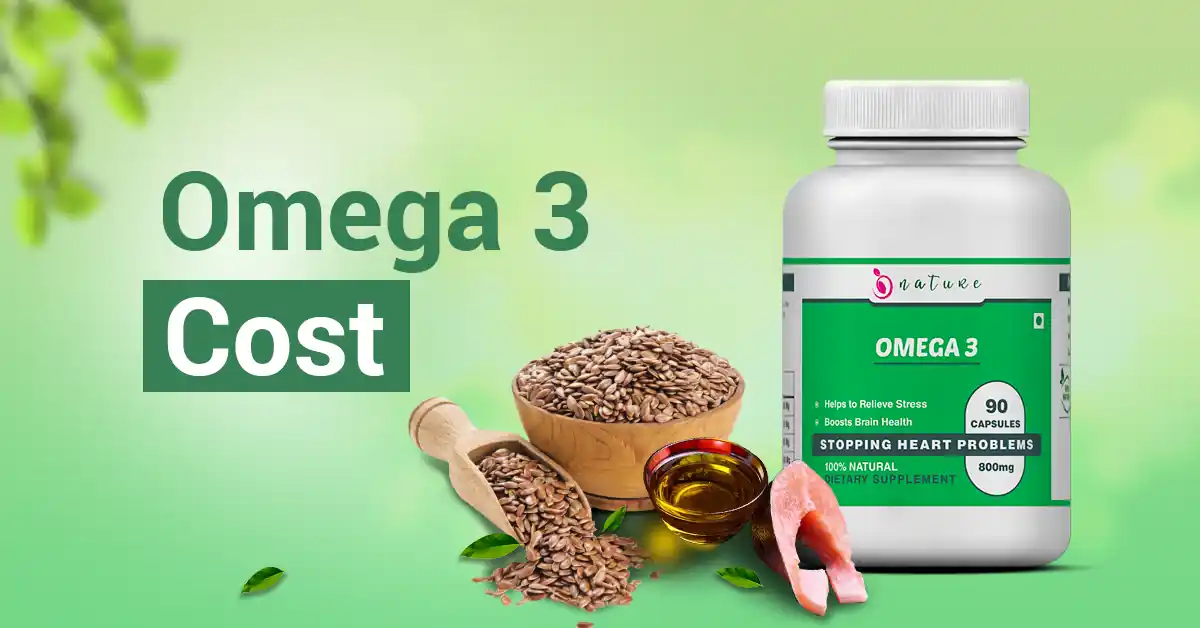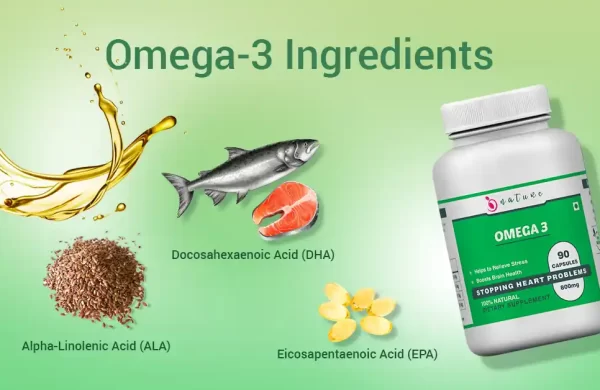In the quest for better health and well-being, Omega 3 Cost have emerged as a highly regarded and essential nutritional component. However, the cost associated with obtaining best omega 3 supplement and foods can be a significant factor in one’s decision-making process. In this comprehensive guide, we will delve into the Omega 3 cost, the incredible benefits these fatty acids offer, and explore the various sources of Omega 3 to help you make informed choices on the best Omega 3 supplement.
Omega 3 Cost: Weighing Health Against Expense
Before we delve into the Omega 3 Cost, it’s crucial to understand the significance of these essential fatty acids. Omega 3 capsules, specifically eicosapentaenoic acid (EPA) and docosahexaenoic acid (DHA), are considered crucial for optimal health. They offer a wide range of benefits, from heart health to brain function, inflammation reduction, and more. However, the cost of obtaining these benefits can vary depending on the sources and forms of Omega 3.
The Value of Omega 3 Benefits
Omega 3 fatty acids provide numerous health advantages, including:
1. Heart Health: Omega 3 are well-known for reducing the risk of heart disease. They lower triglycerides, decrease blood pressure, and improve overall cardiovascular function.
2. Brain Function: DHA, a primary Omega 3 component, is vital for brain cell membrane structure and cognitive function. It may reduce the risk of neurodegenerative diseases.
3. Inflammation Reduction: Omega-3s possess potent anti-inflammatory properties, offering relief for conditions such as rheumatoid arthritis, asthma, and inflammatory bowel disease.
4. Eye Health: DHA, found in high concentrations in the retina, supports good vision and helps reduce the risk of age-related macular degeneration.
5. Skin Health: Omega-3s maintain skin moisture, potentially reducing the risk of skin disorders such as eczema.
6. Mental Health: Omega 3 may alleviate symptoms of depression and anxiety, making them a potential aid for mental health conditions.
7. Pregnancy and Child Development: Omega 3 are essential for fetal brain development during pregnancy and are important for children’s cognitive growth.
With these profound health benefits in mind, let’s explore the various sources of Omega-3 and their associated costs.
Omega 3 Sources:
Omega-3 fatty acids can be obtained from natural food omega 3 sources and best omega 3 supplement Here’s a comparison of both:
1. Natural Food Sources:
a. Fatty Fish: Salmon, mackerel, sardines, and herring are excellent natural sources of EPA and DHA, offering a concentrated dose of Omega-3.
b. Chia Seeds: These seeds provide plant-based Omega-3, specifically alpha-linolenic acid (ALA), which can be sprinkled on cereal, yogurt, or incorporated into smoothies.
c. Flaxseeds: Flaxseeds offer plant-based ALA, which can be ground and added to various dishes, such as oatmeal, soups, or smoothies.
d. Walnuts: Walnuts are rich in ALA and can be eaten as a snack or added to salads, oatmeal, or baked goods.
e. Hemp Seeds: Hemp seeds provide protein and ALA, which can be sprinkled on salads, blended into smoothies, or used to make hemp milk.
f. Seaweed and Algae: For vegetarians and vegans, seaweed and algae are sources of Omega-3, particularly DHA. They can be used in various dishes, including sushi rolls and salads.
g. Grass-Fed Meat: Meat from animals raised on a grass-fed diet tends to have higher Omega-3 content than conventionally raised meat, making it a more nutritious choice.
2. Omega 3 Supplements:
a. Fish Oil: Fish oil supplements are one of the most popular Omega-3 supplements, offering concentrated EPA and DHA.
b. Krill Oil: Krill oil is another marine-based Omega-3 source, containing EPA and DHA, often preferred for its potential for better absorption.
c. Algal Oil: This plant-based source of Omega-3, primarily DHA, is suitable for vegetarians and vegans who don’t consume fish products.
d. Flaxseed Oil: Flaxseed oil is a plant-based source of ALA, which the body can convert into EPA and DHA, although the conversion rate is limited.
e. Cod Liver Oil: Cod liver oil is rich in both Omega-3 fatty acids and vitamins A and D, making it a popular choice for those looking to boost their nutrient intake.
The cost of Omega-3 varies based on your choice of source and whether you prefer natural food sources or supplements. To determine the most cost-effective option for your needs, it’s essential to consider the Omega-3 cost associated with both.
Omega 3 Cost Comparison: Natural vs. Supplemental
The cost of omega 3 sources can differ significantly depending on the sources and forms you choose. Here’s a breakdown of the costs associated with both natural food sources and supplements:
Choosing the Best Omega-3 Supplement for Your Budget Selecting the best Omega-3 supplement for your budget involves a few key considerations:
1. Determine Your Budget: First, establish how much you’re willing to spend on Omega 3 supplements. This will assist you with decreasing your choices.
2. Identify Your Health Goals: Consider your specific health goals when choosing an Omega-3 supplement. If you’re targeting heart health, a supplement with a higher concentration of EPA and DHA may be worth the investment. On the other hand, if you’re looking to support cognitive function, DHA-rich supplements could be a better fit.
3. Read Product Labels: When comparing Omega 3 supplements, carefully read the product labels to understand the concentration of EPA and DHA. Look for high-quality supplements that have undergone testing for purity and contaminants.
4. Consider Form and Source: Choose a supplement form that aligns with your dietary preferences. Whether it’s fish oil, krill oil, algal oil, or flaxseed oil, select the source that fits your lifestyle.
5. Look for Discounts and Bulk Purchase Options: Some brands offer discounts on bulk purchases or subscription models that can provide cost savings in the long run.
6. Consult a Healthcare Professional: Before making a final decision, consult with a healthcare professional or registered dietitian to determine the most suitable Omega-3 supplement based on your health needs and budget.
Conclusion
The cost of omega 3 sources should be viewed as an investment in your health. While natural food sources like fatty fish, chia seeds, and flaxseeds can be affordable, best Omega 3 supplement provide a convenient and concentrated way to ensure you meet your daily Omega-3 requirements.
Ultimately, the best Omega 3 supplement for you will depend on your budget, health goals, dietary preferences, and form/source preferences. By weighing the Omega 3 cost against the invaluable health benefits these fatty acids offer, you can make informed choices that contribute to your overall well-being.
As you embark on your journey to better health, consider the numerous options available to incorporate Omega-3 into your daily routine. Whether through natural food sources, supplements, or a combination of both, Omega-3 can play a pivotal role in optimizing your health, ensuring you lead a healthier and more vibrant life.
You can also read : Fuel Your Brain: Why It’s Important To Take Omega 3



